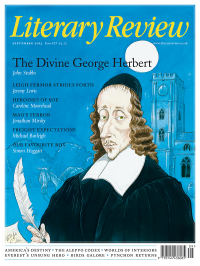Tim Richardson
What Larks
Four Fields
By Tim Dee
Jonathan Cape 278pp £18.99
It’s tough being a nature writer. Stuck in the middle of nowhere, you’re openly ridiculed or else lavished with the tenderness reserved for the soft-headed, your crabby handwriting filling journal after journal with minute observations concerning the machinations of every critter within range. You’re stuck in the middle of the intellectual world, too. Not quite the thing as a scientist, you will be disdained as an ‘amateur’, your painfully won raw data potentially of use but your world-view too narrow to make your observations or conclusions truly meaningful in dissecting rooms and herbaria. Not quite the thing as a literary type, either, you will be perceived as a mere describer of plants, bugs, birds and furry things, and woefully ill-equipped for plot and character development. The banality of weevil.
Today’s nature writers occupy their territory as uncertainly as ever, and the problem is all about structure. How can a nature book with literary pretensions have a beginning, a middle and an end (something all non-fiction editors now demand)? Nature books have to assimilate and present a vast amount of

Sign Up to our newsletter
Receive free articles, highlights from the archive, news, details of prizes, and much more.@Lit_Review
Follow Literary Review on Twitter
Twitter Feed
It wasn’t until 1825 that Pepys’s diary became available for the first time. How it was eventually decrypted and published is a story of subterfuge and duplicity.
Kate Loveman tells the tale.
Kate Loveman - Publishing Pepys
Kate Loveman: Publishing Pepys
literaryreview.co.uk
Arthur Christopher Benson was a pillar of the Edwardian establishment. He was supremely well connected. As his newly published diaries reveal, he was also riotously indiscreet.
Piers Brendon compares Benson’s journals to others from the 20th century.
Piers Brendon - Land of Dopes & Tories
Piers Brendon: Land of Dopes & Tories - The Benson Diaries: Selections from the Diary of Arthur Christopher Benson by Eamon Duffy & Ronald Hyam (edd)
literaryreview.co.uk
Of the siblings Gwen and Augustus John, it is Augustus who has commanded most attention from collectors and connoisseurs.
Was he really the finer artist, asks Tanya Harrod, or is it time Gwen emerged from her brother’s shadow?
Tanya Harrod - Cut from the Same Canvas
Tanya Harrod: Cut from the Same Canvas - Artists, Siblings, Visionaries: The Lives and Loves of Gwen and Augustus John by Judith Mackrell
literaryreview.co.uk